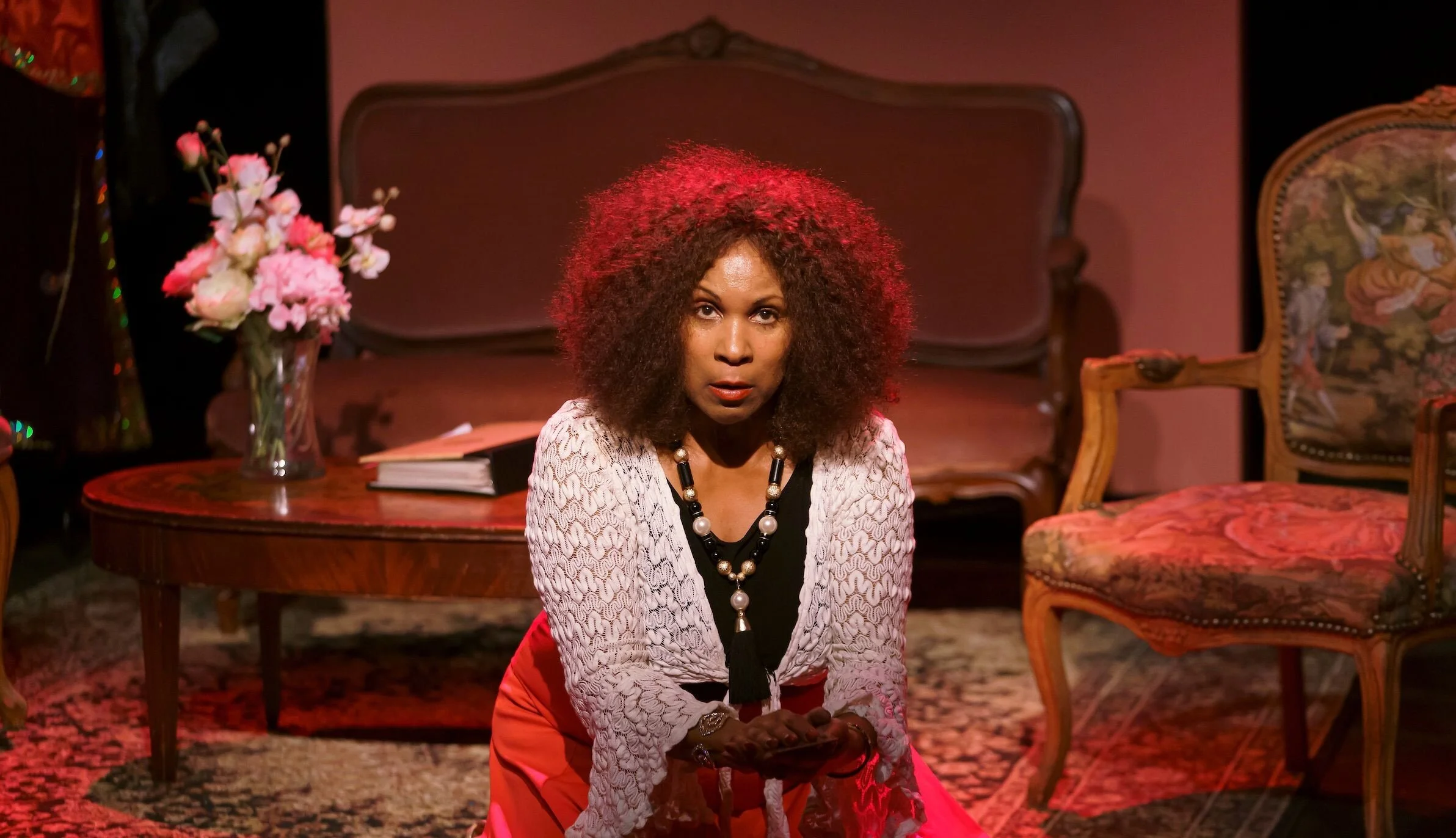Lori Brown Mirabal wrote and stars in Charmed Life at Urban Stages.
Many an autobiographical solo show has been born from hardship— growing up closeted, say, or having an intolerable job, or living through a war. Lori Brown Mirabal’s jumping-off point is the complete opposite. It’s right there in her show’s title, Charmed Life: From Soul Singing to Opera Star.
“I’ve always felt I’ve lived a charmed life,” she says early in the play, and then a couple of times later on, though she never really embellishes on what’s made it so. Still, you can’t fault her for her positivity, and it’s extra-admirable considering her profession is the one that gave us the term “prima donna.”
Mirabal, an opera singer, recalls a favorite role, in Bizet’s Carmen. Photographs by Ben Hider.
Mirabal is an opera singer, who’s sung principal roles throughout the U.S., Europe and China. (She also was in the 1990s Broadway revival of Show Boat and toured in Bubbling Brown Sugar with Cab Calloway.) In Charmed Life, she’s a warm and down-to-earth presence—not at all a diva.
The living-room set, designed by Jaime Terrazzino, could certainly be a diva’s plush dressing room, complete with a large portrait of herself on the wall. But even that is more about sentiment than ego: As Mirabal explains, it was painted by her artist-turned-minister father, his last-ever Christmas present for her.
The painting depicts Mirabal as Carmen, her most frequent role. While she sings excerpts from Tosca, La Bohème and Porgy and Bess, Carmen is the only opera she goes into depth about, narrating a condensed version of the plot, punctuated by condensed versions of its arias. She also reflects on the stamina—and castanets skill—required to play Carmen. A few more insights like that on various operas would make Charmed Life seem more substantive.
The same goes for other thoughts and memories Mirabal shares: The script is strongest when they’re specific and personal, as when she describes the theatrical talents she inherited from her grandmothers or the demands of performing in opera versus musical theater. She tells a nicely detailed story of a Juilliard master class with Luciano Pavarotti where he kissed her hand. In contrast, her encounter with another icon is related somewhat clumsily. As a teenager, Nashville native Mirabal won a Tennessee talent pageant and was interviewed by a pre-fame Oprah Winfrey, then working in local TV news. Except Mirabal relates this by saying, “Guess who came to interview me?” and playing a voice-over of a “You get a car! You get a car!” impersonation. “Years later,” Mirabal adds, “Oprah paid for me to study at the Manhattan School of Music.” How did that come about? This story would benefit from more particulars, less hackneyed Oprah imitation.
Wearing a shawl he gave her, Mirabal memorializes her best friend, Marvin, when she speaks about those she lost to AIDS.
Virtually all the recorded voice-overs, in fact, would be better relayed live by Mirabal (it’s presumably her voice in the recordings), whereas the other multimedia component—personal photos, projected on the back wall—does enhance the production.
Charmed Life, which is directed by Vincent Scott, is not quite a solo show, as Mirabal shares the stage with a pianist (John DiPinto or Allison Brewster Franzetti, depending on the performance) who also speaks a line here and there. Nobody is credited as costume designer, so the sleek black jumpsuit with skirt overlay that Mirabal wears must be from her personal wardrobe. Outside of a few character or nostalgic pieces she takes from a trunk, the only thing she puts on—toward the end of the play—is a voluminous purple velvet appliquéd robe. Mirabal doesn’t say whether the robe was custom-made for her or came from a role she played; it would be nice to know its provenance, as it makes quite the impression.
A few other omissions are noticeable, particularly regarding her experiences as a Black person born in the segregated South and working in the traditionally white world of opera. She does address these topics, but in a fairly perfunctory, almost platitudinous manner. “My biggest surprise as I traveled the world singing was the heartbreaking reality that racism exists everywhere,” Mirabal states. On her decision to pursue opera rather than musical theater, she says, “While there were still challenges for black singers in opera, if you could sing a role well, it was more often available to you”—which may be a bit oversimplified.
But Mirabal isn’t here to weigh you down with injustices and conflicts. Her good-humoredness and ingratiating storytelling offer a pleasant way to ease back into live theatergoing. Urban Stages’ original run of Charmed Life was halted after just three performances in March 2020 when the pandemic shut down theaters. Hearing Mirabal sing “Summertime” reminds us what we’ve been missing.
Charmed Life runs through Aug. 1 at Urban Stages (259 W. 30th St.). Performances are at 7:30 p.m. Wednesday through Saturday; matinees are at 3 p.m. Saturday and 5 p.m. Sunday. Tickets are available by calling (866) 811-4111 or visiting urbanstages.org.





